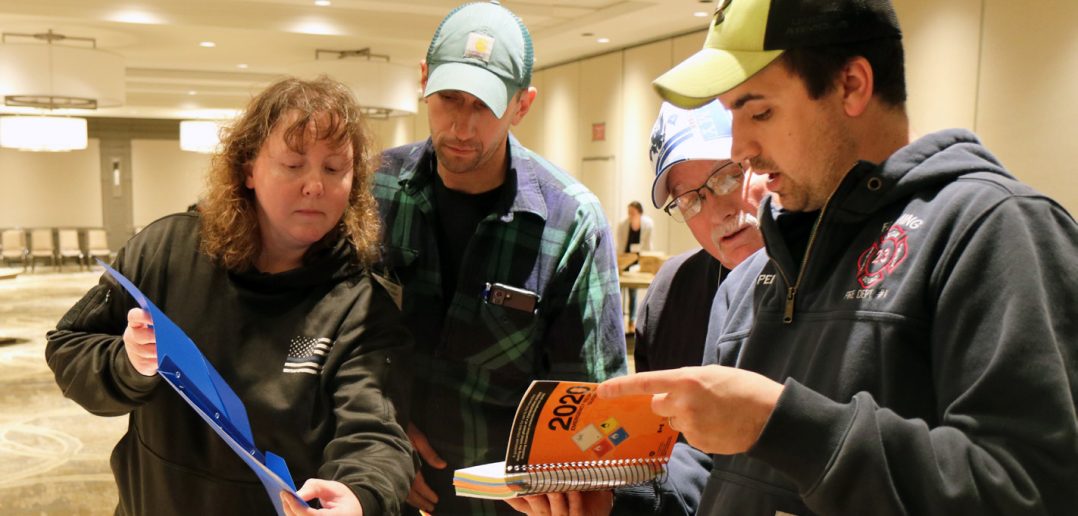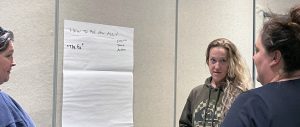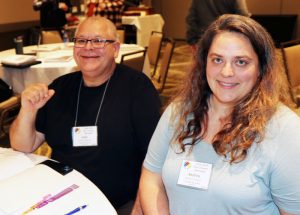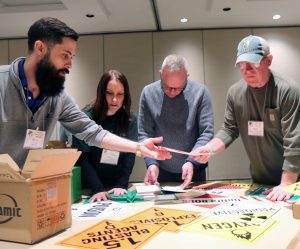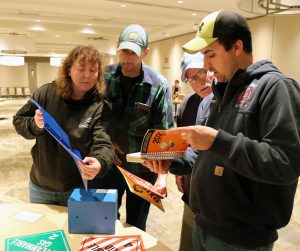
Auburn Correctional Facility employees solve a problem during an “escape room” activity. From left to right are NYSCOPBA member Angel Johnson, NYSCOPBA member Josh Reinhart, CSEA Auburn Correctional Facility Local Vice President Bill Pelc and Auburn Correctional Facility Local member Brandon Pelc.
SARATOGA SPRINGS — Peer Trainers from across the state recently came together in Saratoga Springs for a training refresher that helps save lives and keep CSEA members safe.
Our union’s Peer Trainer program is a labor-management initiative that focuses on training workers on best practices to help eliminate all preventable workplace injuries and fatalities stemming from hazardous job duties. In 2007, CSEA’s Occupational Safety and Health Department took over administration of the Peer Trainer Program from AFSCME.
The program is funded from two five-year federal grants that CSEA receives from the National Institute of Environmental Health Sciences. These grants allow CSEA to provide training at no cost to the workers or the employer, to create safer working conditions. It also provides the employer with additional resources to work toward a workplace free from recognized hazards.
The three-day program brings together CSEA members, other union members and management for the latest updates on workplace safety.
The Peer Trainers, in turn, bring back to their workplaces the knowledge they gain. Not only do they train their co-workers, but their activism and knowledge informs safety policy and strengthens labor-management initiatives, with the goal of reducing workplace injury or death.
Town of Clifton Park Highway Unit Treasurer Matt Farnsworth discussed changes to safety training programs over the last two decades and the role of technology in information access and sharing to boost workplace safety.

From left to right, Village of Suffern Unit President Joe Hunt and Town of Clifton Park Highway Unit Treasurer Matt Farnsworth collectively have more than 35 years of experience as Peer Trainers.
“Over the years, I’ve noticed that information has become easier to come by with the use of CSEA-provided computers,” said Farnsworth. “The access to email and the web means information exchanges and help from CSEA trainers is quicker.”
Women’s safety at forefront
Other changes reflected in newer trainings include the growing number of women in operational roles. More women are becoming Peer Trainers and taking on leadership roles and management training positions.
This year’s Peer Trainer Refresher agenda brought safety issues that concern women to the forefront through the creation of the Women’s Caucus and dedicated training sessions.
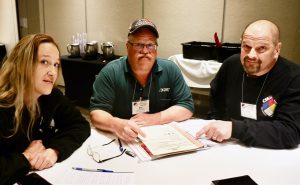
From left to right, Women’s Caucus Member and Niagara Frontier Parks & Recreation Local President Jamie Hart prepares for a presentation with Niagara Frontier Parks & Recreation Local member Ron Wik and City of North Tonawanda Unit member Greg Myers, who works at the city’s water treatment plant.
CSEA Niagara Frontier Parks & Recreation Local President Jamie Hart, a Women’s Caucus member, reflected on the caucus’ role.
“This is my third year attending the CSEA Peer Trainer Women’s Caucus,” said Hart. “Meeting back each year, it’s inspiring to see the growth of these women in leadership roles and I especially appreciate that we are solution oriented in addition to being a much-needed support to one another.”
Hart noted that women in operational roles sometimes have different needs than that of their male co-workers, including the need for personal protective equipment (PPE) geared to women. Women’s Caucus Peer Trainers have been leading the way to urge employers to provide this PPE.
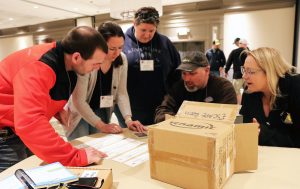
From left to right, City of Oneonta Unit Treasurer Rob Stevens, PEF member Erin McPeak, Syracuse State Employees Local member Abbyjane Dapson and Oneonta State Employees Local member Billy Vitarius Jr. work together on an “escape room” exercise as Peer Trainer Program Coordinator Janet Womachka-Souery, far right, guides them.
“Because we are Peer Trainers in our respective agencies, we’re able to identify those women’s issues specific to safety because we’re training these women in our workplaces,” said Hart. “(CSEA Peer Trainer Program Coordinator Janet Womachka-Souery) brought more PPE in from Safety Girl (an online retailer that specializes in women’s personal protective equipment) such as safety harnesses, hi-vis (visible) jackets and vests specifically made to fit women – they exist! Employers should be providing PPE that fits and we are continually advocating for this.”
Training continues long after attendees return home, as the Peer Trainers keep communication channels open.
“Staying in touch with fellow trainers for help and feedback is really important,” said Farnsworth. “One thing that has never changed is the dedication, caring and support from all the CSEA program trainers and peer trainers.”
— Therese Assalian
For safety resources, visit cseany.org/safety
- From left to right, Syracuse State Employees Local member Abbyjane Dapson, Niagara Frontier Parks and Recreation Local President Jamie Hart and High Peaks State Employees Local member Andrea Dukett prepare for the Women’s Caucus presentation on how to be an ally to women in the workplace. (Photo by Janet Womachka-Souery)
- From left to right, Palisades Interstate Park Commission Local President Robin Hammond and PEF member Erin McPeak discuss important issues during the Women’s Caucus session.
- From left to right, High Peaks Employees Local President John Lefebvre, who is a 15-year Peer Trainer, attends the training with High Peaks State Employees Local member Andrea Dukett, who has been a Peer Trainer for three years.
- Peer Trainers try to win the escape room team competition. From left to right are Moreau Lake State Park Manager Kevin Dinon, PEF member Katie King, Village of Suffern Unit President Joe Hunt and Town of Clifton Park Highway Unit Treasurer Matt Farnsworth.

